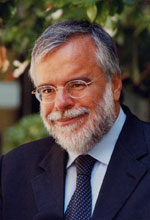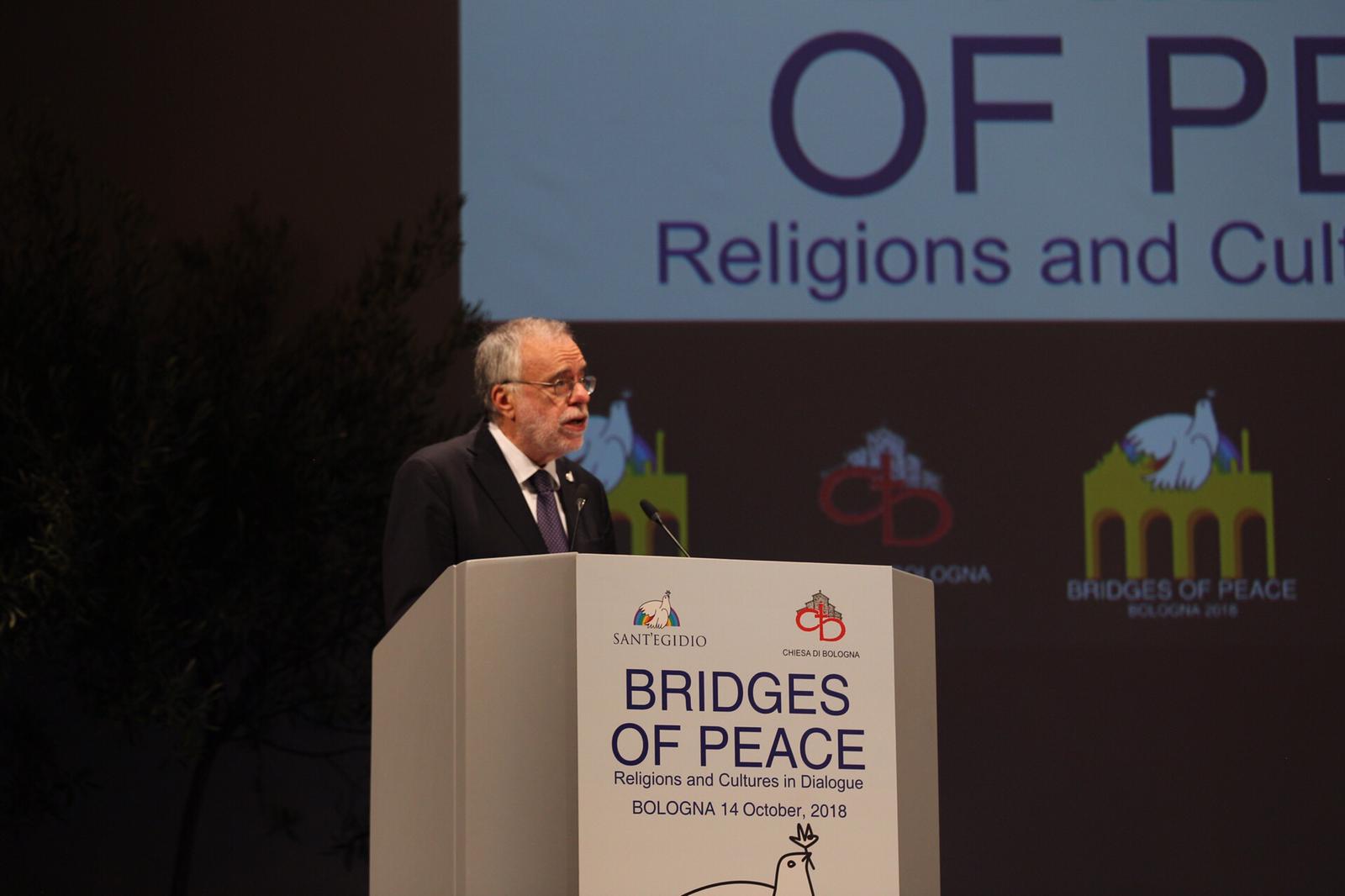
Meeting each other again in Bologna, a city always sensitive to peace and dialogue (I am thinking of the 60s and of Card. Lercaro), is the right place for us. I thank for his invitation Mgr. Matteo Zuppi, a man of peace, peacemaker in lands of war, and a brother to me. Bologna is a great occasion and it comes in a delicate moment to carry on unwinding the uninterrupted thread of dialogue, initiated in Assisi by John Paul II in October 1986, during the Cold War: a dialogue that endured different, difficult scenarios, of warmongering and hostility, but also unhoped-for peace agreements.
Many of the attendees, leaders and believers, have been its actors and protagonists. Many are devoted to this recurring event, because they can perceive the profound bond that brings together a spiritual attitude, prayer and dialogue. I will only mention Coptic Bishop Amba Epiphanios, a humble man of dialogue and friend of our meetings, recently killed in a violent act in Egypt. Spirituality and dialogue are not for religious men and women alone, they pertain to humanists too, as Abraham Yehoshua wrote, "although I do not believe in God, his presence in the minds of so many human beings concerns me and affects me".
The Cold War, the Wall and the balance of terror seemed overcome by the euphoria of globalization after 1989: almost like providence, leading everything toward development and harmony. Everything – from the economy, to finance, to the media – was unifying, giving rise to a global belle époque. All negotiating with the winning globalization was disregarded. But beside the giant of globalized economy, a spiritual unification through dialogue was missing. Spiritual worlds often remained attached to traditional horizons of the past. On many occasions religions did not perceive globalization as an adventure for the spirit, though they were experiencing unprecedented encounters and a number of troublesome scenarios. John Paul II, with foresight, sensed it in Assisi in 1986.
By contrast, some religious sectors bound themselves to forces resisting globalization, sacralizing fundamentalist identities, identities opposing each other, at times terrorist identities, detaching themselves from their own historic and cultural backgrounds. Dialogue, this ancient and very religious art, was cast aside to fight each other, or to talk rapidly and antagonistically. War of religion or religious violence was legitimized.
The global world did not bring about peace, rather it caused horrifying wars, such as in Syria, since 2011 (and I greet Patriarch Ephrem). Today, now that the belle époque optimism is over, the global world is marked by divisions, walls, antagonisms. Many fears linger in the hearts of people, who look for reassurance, even while they confront each other like enemy tribes.
At every latitude, people are afraid. Yet, in the northern world, we have never witnessed times as safe as these. Zygmunt Bauman, who attended our meetings, wrote: “The best technologically equipped generation in human history – our own – is also… afflicted as no other by feelings of unsafety and powerlessness”. We are experiencing what Mircea Eliade calls the “fear of history”, which leads to multiplying defenses, fortifying identities and one’s own spaces, attacking, speaking harshly to each other.
Religions also risk being drawn into this fortification of their own space and identity, prey to nationalisms or antagonisms. The self-reference of religions, closed inside their fences, is the slumber of the spirit. This is happening while projects of unity or community among peoples are in crisis; unifying tensions have reduced among religious communities. And the “self” or a limited form of “us” realistically prevails.
Over these years, the spirit of Assisi has flowed in the opposite direction, and recurrently summoned people to meet, it has unveiled fanaticism, affirming that war in the name of religion is war against religion. The Spirit of Assisi calls upon us to exit the walls. Is it useful in a warmongering world? Verbal clashes actually set the premise to real antagonisms; arsenals are readied while threatening speeches are held. There is no hegemony able to hold together a fragmented and complex world. World governance is nowhere to be seen.
There is however need of a global and ecumenical vision in order to live, breath, build peace and live in peace: it is the awareness that we all, men, women and peoples, form one human race. In a frightened, divided and angry world, religions are a gust of serenity that nourishes the awareness of a common destiny among peoples. They teach that men and women are engaged in a long journey towards their common destiny. They say so in different ways and employing different spiritual tongues. It is a basic awareness, as simple as bread and as needed as water, solid and comforting.
A common destiny in diversity: “All relatives, all different” – said anthropologist Germaine Tillion, who survived a Nazi lager after much suffering. At times, sadly, the awareness of a common humanity is lost in the intricacy of hatred and self-interests, in distances, in daily plain deviousness, in shouted propaganda, in fanaticisms, in the logic of hatred. One does not recognize the other’s humanity. Ancient scorns rise again, barely repainted, like old nationalisms that seemed to be buried, or the idea of races.
With the experience of traveling through many different facets of the world, Kapushchinsky wrote: “every time man has met another man, he has always had three choices before him: to make war against him, to isolate himself from him behind a wall, or to establish dialogue”. We need to give new drive to the art of dialogue, to consolidate the sense of a shared destiny, root and path of peace and of living together. The art of dialogue is an authentic and peaceful speech, nourished by encounters, not an aggression against the other taking up words as weapons: it brings people closer, it highlights what they share, it is respectful. The art of dialogue, Bauman insists, is “something that humanity needs to let itself be confronted with, more than anything else, because the alternative is far too dreadful...”. The alternative is war, or a dark world of hatred! This world, which has been untouched by wars for years (looking at the others’ wars from a distance), no longer has the sensitivity to perceive how it is just a few steps before you slip into the evil tunnel of conflict. We need to start keeping watch once again!
Through dialogue the broken pieces of the world, dangerous atoms and broken bridges are woven together. A spiritual man of the 20th Century, Paul VI, who is canonized today, once said: “Behold... the transcendent origin of dialogue... in God’s very intention. Religion is by its very nature a relationship between God and man. Prayer expresses such a relationship through dialogue”. To be religious is to be in dialogue.
In their thousands of years of wisdom, honed by prayer and by being in touch with the suffering of men and women, religions are workshops of humanity. They are living organisms: they gather and listen to the yearnings of men and women. They are not ideoloogies, they are communities, rooted in different lands, close to the sorrow, the joy and the sweat of people, capable of heeding their every breath. I have beheld the prayer of many desperate people, in situations of pain or in the terrible flight of refugees.
From the depth of their traditions, from different paths, religions educate to dialogue as transcendence from the self in prayer, which opens up to an encounter. The new fundamentalisms, however, mean to strip religions of their profound and stratified ties to culture, they wish to unculturate them and reduce them to blunt weapons or ideologies. On the contrary, religions are also the stratified cultures of peoples: they combat ignorance, even when it is presented as holy, and fanatical simplifications, recalling our shared human nature, which is God’s will. A great companion on our path once said, many years ago:
“Every religion, at its best, tends to peace. We are aware that religion in itself is a weak force. It is alien to arms, to political power… But it does possess the strength of the spirit, which can make it strong, invincible, and ultimately victorious”.
For this reason, it is appropriate to call men and women to their inner being again, as Mgr Zuppi said. We all need it, and the world needs it. A man of God here in Bologna, Giuseppe Dossetti, once said many years ago: “the indispensable starting point today, in my opinion, is to loyally state and pursue, in such bacchanal of the outer being, the absolute primacy of interiority, of the inner being”.
Religion can reanimate the workshops of unity of the human family, give new drive to unitive energies, propose a pacified language. This is the sense of this meeting of ours.
“Today more than ever in the past, religions must understand their responsibility to work for the unity of the human family” – John Paul II used to say. Religions and cultures can give new life to this vital awareness, which needs to be spread among everyone through preaching and education. It is not something academic, it is as simple as faith itself: “Be simple, with intelligence” the great John Chrysostom used to teach.
I am grateful to Bologna for hosting this event. I am grateful to the many volunteers who generously participated in organizing this congress. I thank those who are taking part in the dialogue and prayer: this is the sign of a shared horizon of unity where dissimilar lights shine. A companion on our journey since 1987, Card. Carlo Martini, who passed away a few years ago - a blessed name – ended our meeting in Milan in 1993 with these words:
“… from the crossroads of different religious paths stems a great help to diminish our focus on ourselves, to increase our capability to grasp the complexity of life and of the world. It makes us more capable of seeking, together, the solutions to impossible conflicts… There is no future in war… There is no hope that wars might be silent if the heart of man does not change. There is no force greater than the weakness of prayer”.
Prayer side by side without denying differences, dialogue and encounter, as we do here in Bologna, show that the future is alive in the bonds between humble seekers of peace, which can be accomplished in every situation; they show that peace is possible and is at the heart of every religion, because it is the beautiful name of God.
We cannot confine ourselves to the rapid realism of the news, sometimes foul and fake, and become prey to pessimism, emotionality, or a sense of irrelevance as we face overwhelming confusion and evil. Pessimism is a deadly advisor. Men and women of prayer are aware that the world has not been delivered to evil, it will be liberated, because God has not forsaken it. To build bridges of peace, even when the currents are adverse, not to be resigned to walls and chasms, means to believe that a lot – even everything – can change.
I wish to conclude with the words of Pope Francis on the 30th anniversary of Assisi:
“We who are here together and in peace believe and hope in a fraternal world… Our future consists in living together. For this reason we are called to free ourselves from the heavy burdens of distrust, fundamentalism and hate. Believers should be artisans of peace in their prayers to God and in their actions for humanity! As religious leaders, we are duty bound to be strong bridges of dialogue, creative mediators of peace”.
